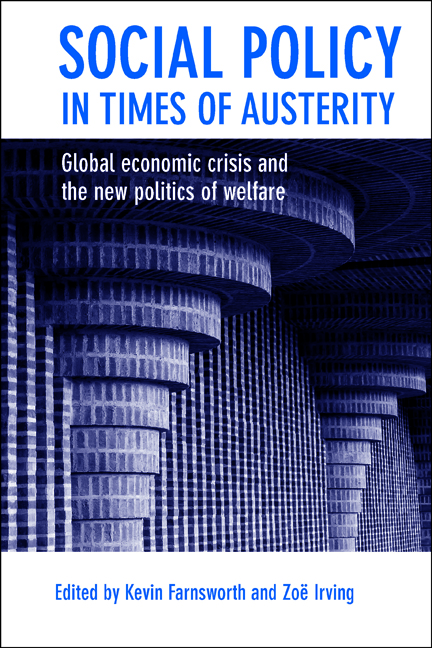Book contents
- Frontmatter
- Contents
- List of figures and tables
- Notes on contributors
- Acknowledgements
- Introduction Social policy in the age of austerity
- one Austerity: more than the sum of its parts
- two Conventional wisdom on government austerity: UK politics since the 1920s
- three The economics of austerity
- four Neoliberalism, finance-dominated accumulation and enduring austerity: a cultural political economy perspective
- five Alternatives to austerity
- six Crisis, convulsion and the welfare state
- Conclusion A new politics of welfare
- Index
four - Neoliberalism, finance-dominated accumulation and enduring austerity: a cultural political economy perspective
Published online by Cambridge University Press: 11 March 2022
- Frontmatter
- Contents
- List of figures and tables
- Notes on contributors
- Acknowledgements
- Introduction Social policy in the age of austerity
- one Austerity: more than the sum of its parts
- two Conventional wisdom on government austerity: UK politics since the 1920s
- three The economics of austerity
- four Neoliberalism, finance-dominated accumulation and enduring austerity: a cultural political economy perspective
- five Alternatives to austerity
- six Crisis, convulsion and the welfare state
- Conclusion A new politics of welfare
- Index
Summary
In line with interest in varieties of capitalism, one might expect to find varieties of austerity. This is confirmed by the historical record – austerity has different origins, dynamics and effects in different periods – and by comparisons in the same periods. Another source of variation is how (and how far) pursuit of austerity rearticulates the economic and political in terms of policy, politics and polity. This chapter explores these issues through cultural political economy (CPE). This heterodox theoretical approach takes the cultural turn seriously but not one-sidedly in the critique of political economy. It can be said to combine interest in the economic, political and social imaginaries that shape capital accumulation and state projects with a critical analysis of the changing articulation of the economic and political in capitalist social formations. After brief comments in these terms on austerity policies in the ‘golden age’ of Atlantic Fordism, the analysis concentrates on post-Fordist accumulation regimes. To illustrate the variegation of austerity policies, politics and political transformation in this context, the US and UK serve as exemplars of neoliberal finance-dominated accumulation. Attention then turns to economic and fisco-financial crises in Continental Europe as organised in the shadow of a German-led neo-mercantilist bloc. European efforts to address contagion effects from the North Atlantic Financial Crisis (NAFC) as well as the Eurozone's sui generis crisis dynamics involve other forms of austerity policies and politics. This is illustrated from Germany and Greece. The conclusion considers the limits to neoliberal austerity and the catastrophic equilibrium of forces that is blocking efforts to overcome them.
Cultural political economy
CPE posits that, since the world is ungraspable in all its complexity, individual and collective agents must resort to simplified understandings in order to be able to ‘go on’. What actors construe as significant in this enforced selection is not cognitively hardwired or otherwise preprogrammed. It depends on sense-making systems that give ‘meaning’ to some aspects of the world and to their own and others’ place within that world. While any construal may be as good as any other for internal meaning-making purposes, matters change when we ask which of many alternatives gets translated into effective social practices. To paraphrase Orwell, while all construals are equal, some are more equal than others. That is, some are more powerful than others in structuring personal, organisational and inter-organisational interaction, institutional and inter-institutional dynamics, and the wider social order.
- Type
- Chapter
- Information
- Social Policy in Times of AusterityGlobal Economic Crisis and the New Politics of Welfare, pp. 87 - 112Publisher: Bristol University PressPrint publication year: 2015



